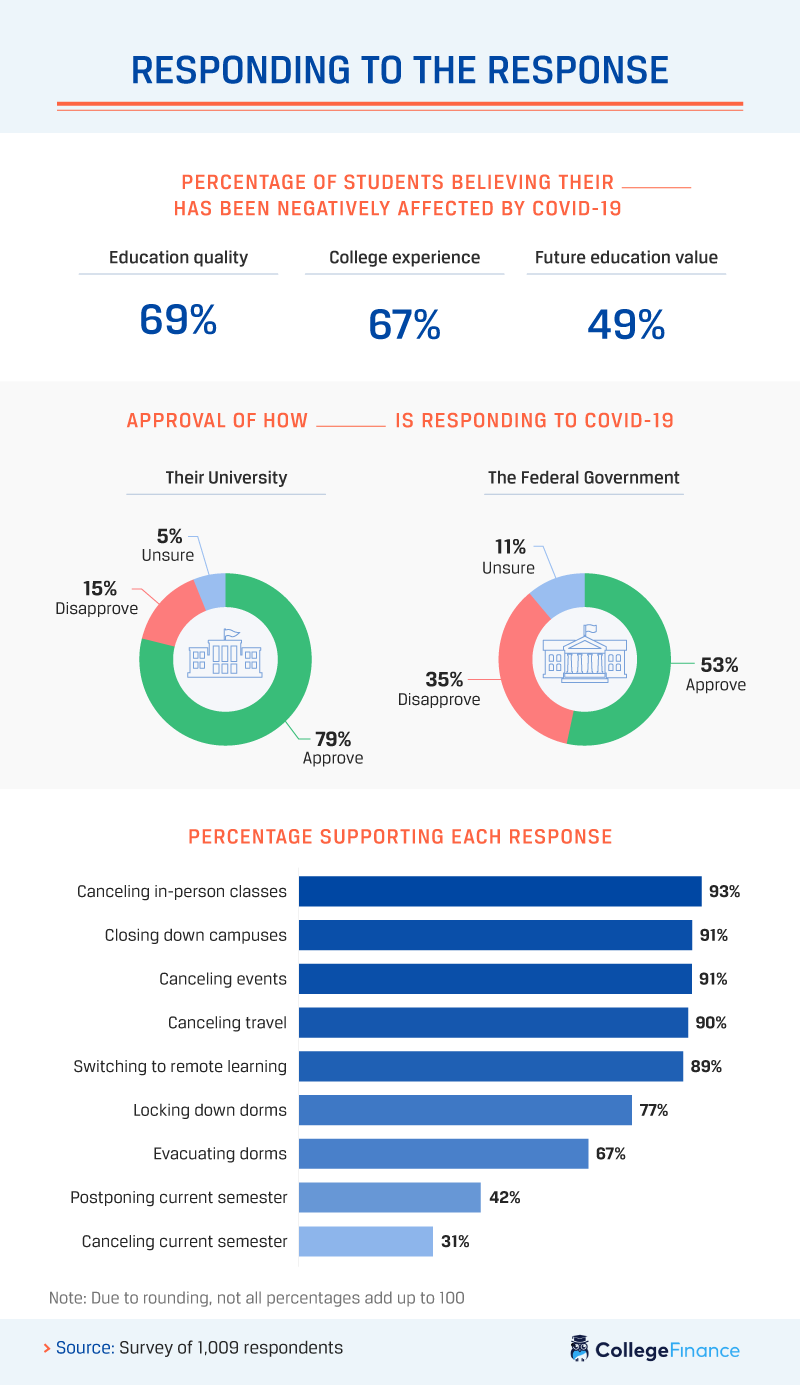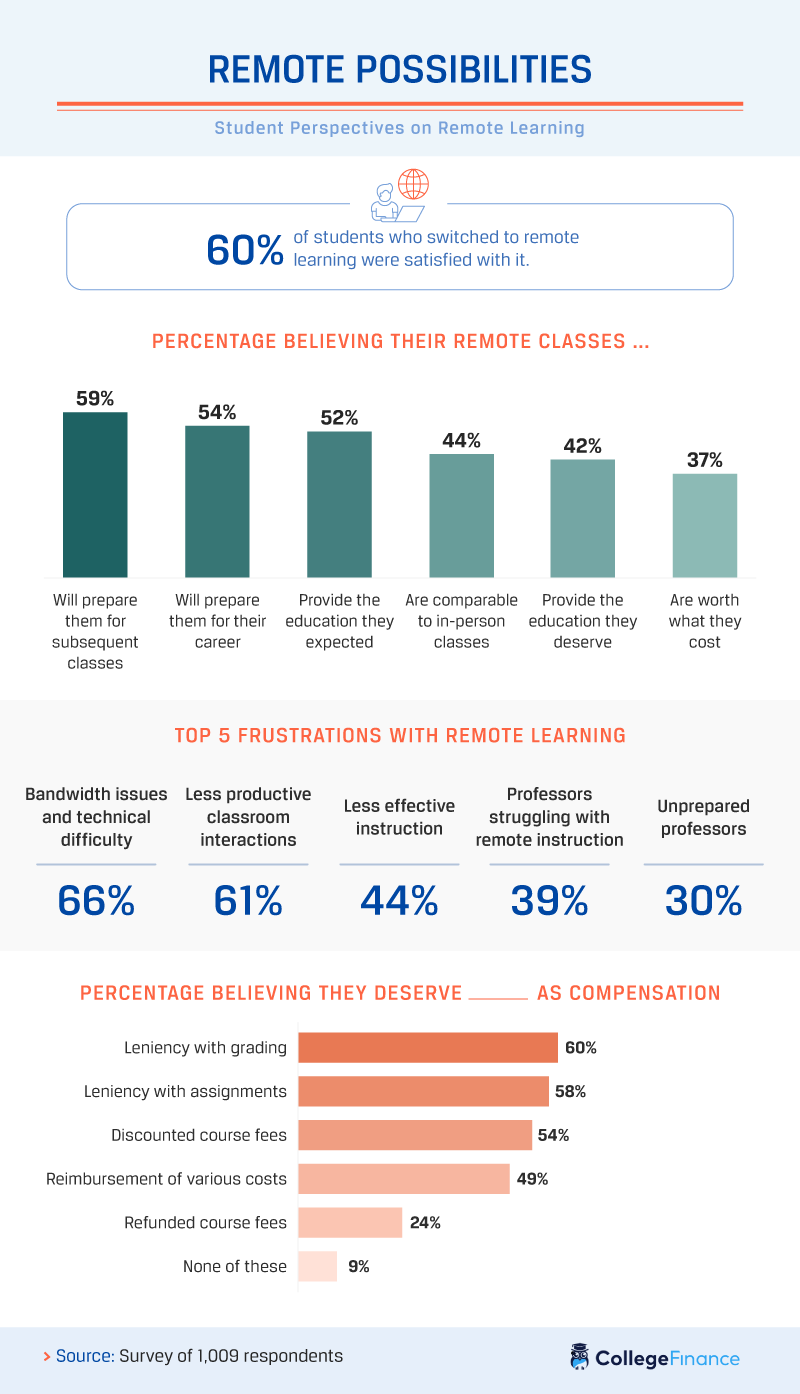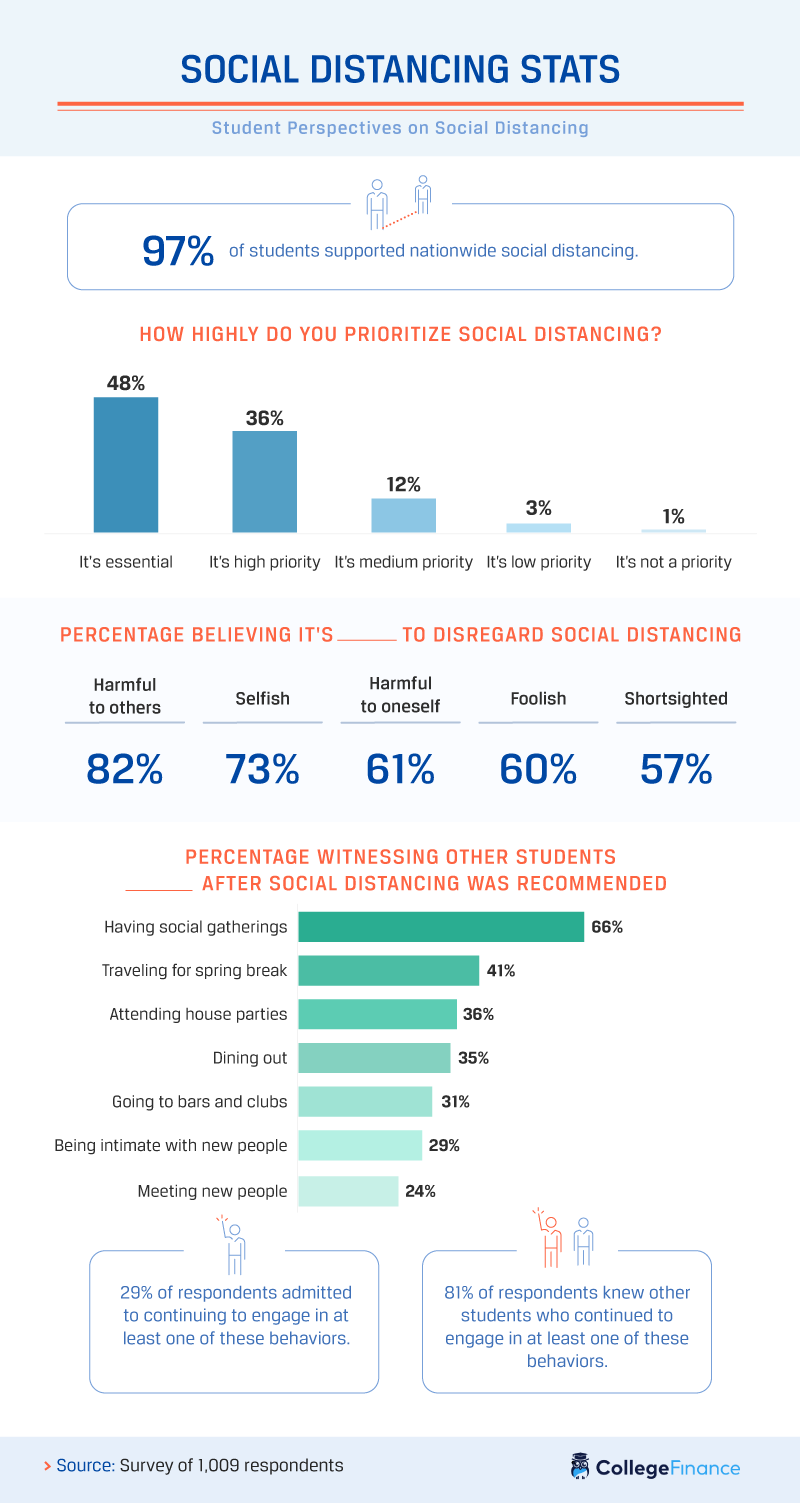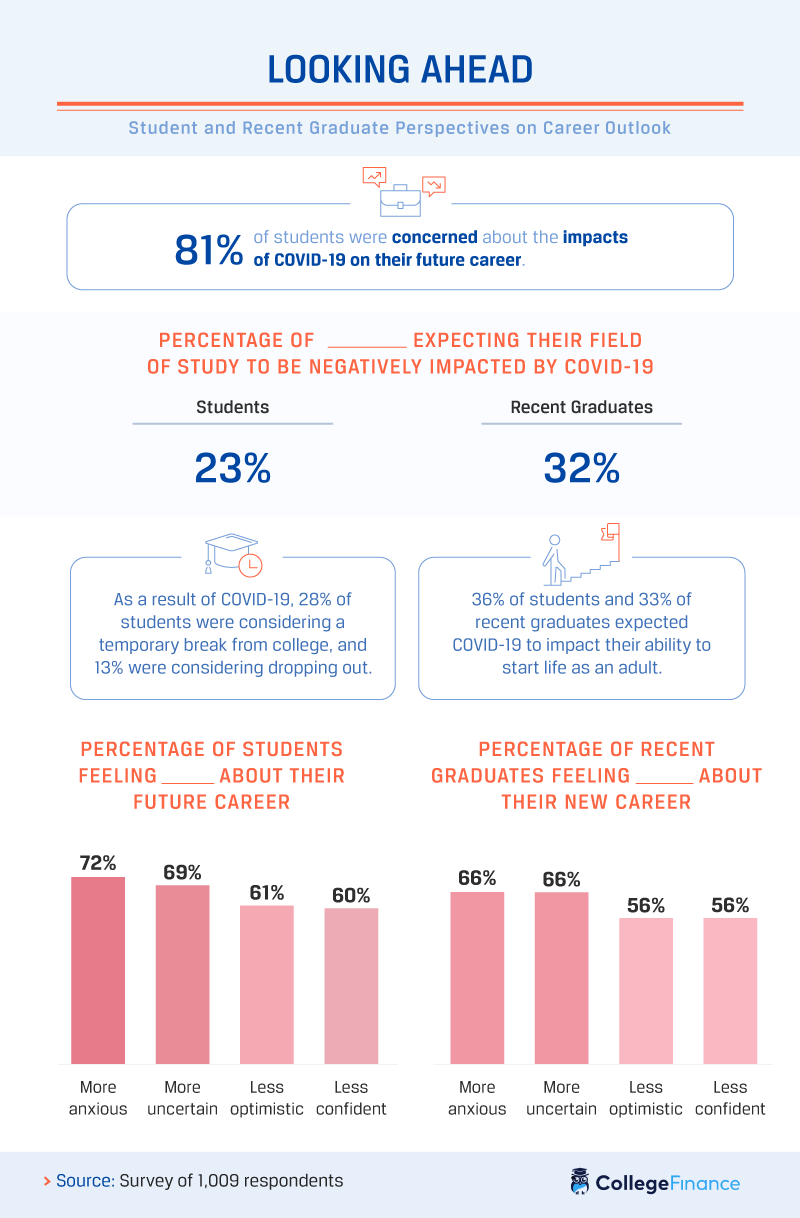Since the start of the COVID-19 pandemic, countless students have packed up their textbooks and headed home for the remainder of the semester as colleges shut their doors nationwide. Without access to in-person classrooms, American schools have scrambled to get their classes online, bring faculty up to speed on how to use unfamiliar software, and find the resources to support an entire college’s worth of e-learning. As students continue to pay tuition and student loans, pressure remains high on schools to continue providing a great student experience.
For some students, the new coronavirus has shaken up the last few weeks of their final semester of college. For others, this is a very strange and unsettling end to their freshman year. The rest fall somewhere in the middle. But no matter where you are in your college experience, these rapid and unprecedented changes likely have you feeling a certain way.
We surveyed over 1,000 students and graduates to find out how they feel about the government’s response to COVID-19, social distancing measures, remote learning, and more. Are they optimistic about their prospects, or do they envision a career in peril? Read on to find out.
Semesters in Crisis
Did students feel their schools have taken appropriate measures in the face of COVID-19? How about the government?
Most students felt the quality of their education has been negatively affected by the pandemic, at a rate of 69%. Another 67% believed it is negatively impacting their college experience (no more house parties, no more dorm life, limited to no in-person social interaction), and 49% thought it would affect the future value of their education.
While more than three-quarters of students were satisfied with how their university has responded to the coronavirus, just 53% felt the same way about the government– a majority to be sure, but much less compared to schools. Toward the end of March, the Coronavirus Aid, Relief, and Economic Security (CARES) Act was signed into law, which is intended to provide financial relief and support for individuals and businesses. But on the flip side, critics have not been shy to point out a number of perceived shortcomings on behalf of the Trump administration.
At least 90% of respondents supported measures like canceling in-person classes, closing campuses, canceling events, and canceling travel. Locking down dorms and evacuating dorms were also generally accepted as positive. However, efforts such as postponing the semester and canceling the semester garnered less than 50% of students’ support, likely due to the potential impact on their personal timelines and future careers.
Webcam Woes
While the majority of students were satisfied with the quality of their remote instruction, our survey revealed a number of underlying issues related to the online classroom.
When it comes to online learning, some people find it difficult to focus on a screen, while others are perfectly happy attending class in their pajamas. Overall, 60% of respondents whose classes shifted to online said they were satisfied with the remote classroom experience. However, others weren’t so lucky, including the millions of Americans who don’t have access to the internet at home (and are, therefore, unable to attend online classes in the first place).
More than half of students felt their online education would prepare them for future classes and their career while providing a satisfactory level of education. Others have lamented the fact that they have received PowerPoint presentations from their teachers in lieu of live online instruction, and more specialized courses like music are hindered due to sound quality issues.
The most common issues had to do with bandwidth (66%) and less productive interactions (60%), which likely go hand in hand – between lag, video quality, and people talking over one another, it’s tough to have meaningful discussions. For their troubles, students felt they deserved leniency with grading (60%) and assignments (58%), as well as a discount on course fees (54%) and reimbursements for general costs (49%).
Going the Distance
If you accessed the internet in late March, you likely came across a news report about college spring breakers in Miami. The short clip, which featured such declarations as “If I get corona, I get corona,” went viral.
While the report painted a remarkably poor picture of college-age individuals and their quest for alcohol at all costs, our respondents had something different to say: 97% supported nationwide social distancing, and 48% prioritized it as an essential measure. Students viewed disregarding this measure to be harmful to others (82%), selfish (73%), and harmful to oneself (61%).
As with most things, though, social distancing proved to be more easily said than done. Two-thirds of respondents knew of students who were continuing to host social gatherings, and 41% knew someone who was still slated to travel for spring break. Attending house parties (36%), dining out (35%), and going out to bars and clubs (31%) were clearly difficult for people to give up, as well.
An Uncertain Future
For many students and recent graduates, feelings of hope and excitement surrounding future employment have soured. Here’s how they’re feeling now.
With almost half of American companies staring down the barrel of layoffs on top of already significant job loss, it’s no wonder so many college students and graduates feel uneasy about their future. Nearly a quarter of current students said they expected their field of study to be negatively impacted by the coronavirus, as did 32% of recent graduates.
While recent graduates technically have more at stake, as new members of the workforce who no longer have another semester to fall back on, they were actually less anxious than students who had yet to graduate. While the majority of past and current students were worried and stressed, students were more anxious compared to recent graduates (72% vs. 66%), more uncertain (69% vs. 66%), less optimistic (61% vs. 56%), and less confident (60% vs. 56%).
For some, the stress was enough to make them reconsider their college career altogether: 28% of students were thinking of taking a break from college due to the impact of the coronavirus, and another 13% felt like dropping out.
Knowledge Is Power
Overall, our survey respondents demonstrated resilience and cautious optimism when it came to their new realities but also worry and uncertainty when looking toward the future. Cutting a college semester off at the knees with just a few weeks left to go has put a significant strain on administrators, teachers, and students alike – but if one thing is clear, it’s that most are doing the best they can.
With so much uncertainty afoot, knowledge is power. College Finance offers a wealth of resources to help students budget, plan for their financial future, pay off their private student loans with confidence, and much more. Visit CollegeFinance.com to learn more about how to get through this particularly challenging time and continue to thrive long after it’s done.
Methodology and Limitations
We surveyed 1,009 respondents using Prolific and Amazon Mechanical Turk. Respondents were selected based on their educational status and history. 718 respondents were college graduates, and 291 respondents were current students. 519 respondents were male, 488 respondents were female, and two respondents did not identify as male or female. Our average respondent was approximately 35 years old.
To help ensure that respondents took our survey seriously, all respondents were required to identify and correctly answer an attention-check question. In some cases, questions and responses were rephrased for clarity or brevity. These data rely on self-reporting, and statistical testing was not performed on these findings. Potential issues with self-reported data include, but are not limited to, exaggeration, selective memory, and attribution errors on the part of respondents.
Fair Use Statement
Knowledge is meant to share, so please feel free to share our data with friends, family, or colleagues for non-commercial purposes. We’re not looking for extra credit, but we do ask that you credit us by linking back to the full study.


